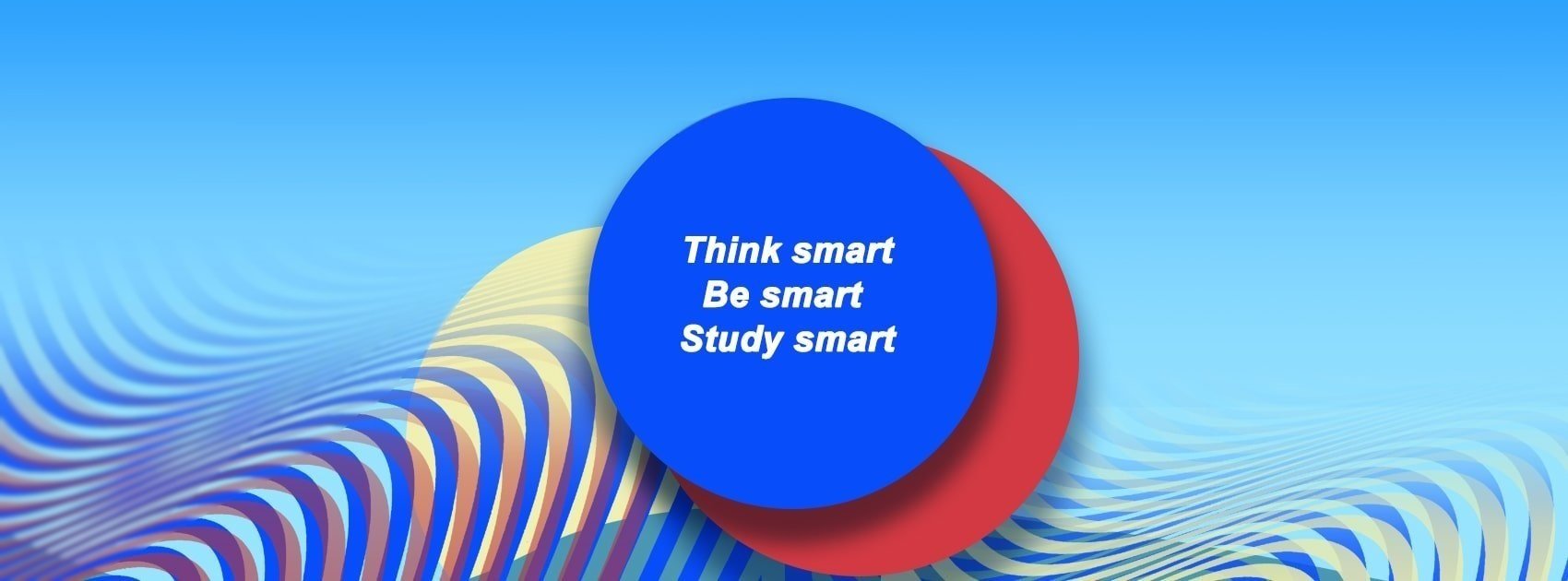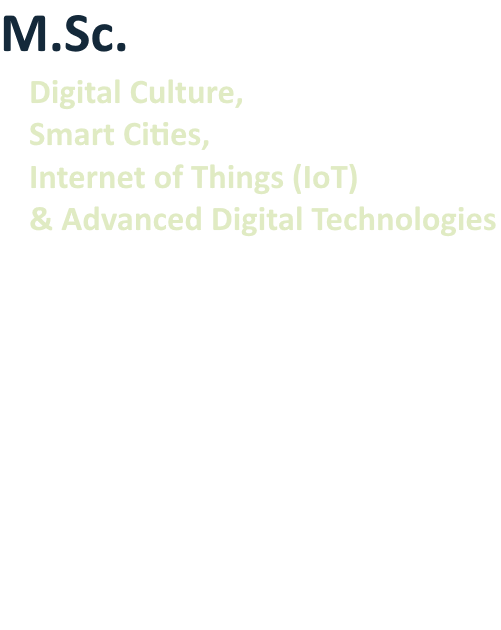MSc in Digital Culture, Smart Cities, IoT, and Advanced Digital Technologies
The MSc program in Digital Culture, Smart Cities, IoT & Advanced Digital Technologies is an excellent choice for young individuals who aspire to stay ahead in the shift towards digital transformation.
This program is designed to provide students with the knowledge and skills they need to succeed in the new multidimensional technological environment.
With a focus on digital #culture and #smart, #sustainable, and #green #cities, students will learn about the latest trends and technologies shaping our world. They will also gain practical experience by working with cutting-edge tools and technologies used in the industry and the market today.
The MSc program awards a Master's Degree (M.Sc.) with the title "Digital Culture, Smart Cities, IoT, and Advanced Digital Technologies" and offers three (3) specialization tracks: "Digital Culture," "Smart Cities and Advanced Digital Technologies," and "Internet of Things (IoT) and Advanced Digital Technologies."
#digitalculture #smartcities #IoT #internetofthings
The MSc program aims to equip scientists from different fields with a common background, enabling them to collaborate and generate knowledge to advance our cities in the digital era. It is a postgraduate program that provides scientists with the necessary skills by connecting Culture with modern technologies, smart cities with Digital Governance, the Internet of Things (IoT) with energy and digital services, and the integration of New Digital Technologies into the contemporary Urban Environment, creating a modern ecosystem.
The postgraduate students of the MSc program in Digital Culture, Smart Cities, IoT & Advanced Technologies actively participate in the activities as members of the Research Group of the UNESCO Chair "Creative Cities in Motion: Urban Sustainable Mobility and Utilization of Cultural Resources," awarded to the Laboratory of Digital Culture, Smart Cities, Internet of Things (IoT), and Advanced Digital Technologies and Services at the University of Piraeus, which is directly connected to the MSc program.
The courses of the MSc program are conducted in person for students within the Attica region but also offer the opportunity for students outside Attica to attend remotely.
The MSc program has a duration of three (3) academic semesters (two (2) semesters for attending postgraduate courses and one (1) semester for completing the postgraduate dissertation).
The MSc program, depending on the specialization, is aimed at graduates from different scientific fields.
The Specialization/Track "Digital Culture" aims to educate and train scientists from various disciplines, including theoretical, scientific, and technological fields, for the promotion, protection, promotion, and management of cultural heritage with the contribution of advanced digital technologies. It provides students with the necessary knowledge of the latest trends prevailing worldwide in the emerging interdisciplinary field of digital culture and ensures the development and shaping of a new digital strategy in the cultural sector. It promotes the preservation and promotion of cultural heritage in our country, highlighting new ways of effective management of cultural organizations within the broader framework of social and educational policies. It combines contemporary knowledge fields, including 3D modeling, the application of mixed reality technologies (Virtual Reality, Augmented Reality, Virtual Worlds), mobile communications, internet technologies, and social media, signal and media processing, with the ultimate goal of optimal digital management, documentation, and curation of cultural heritage as well as aspects of contemporary culture. As our country possesses a rich cultural heritage in a continent (Europe) that is itself a cultural superpower, enhancing interdisciplinary approaches will contribute to the strengthening of the Creative Industries, the protection of our cultural heritage, and the promotion of contemporary creation.
Specialization/Track "Smart Cities and Advanced Digital Technologies"
The Specialization/Track "Smart Cities and Advanced Digital Technologies" aims to educate and train scientists from various fields to work in the new digital urban landscape, as well as to design and support new services in the ever-evolving "Smart Cities" and data analysis. These include infrastructure, operations, and services such as smart transportation, energy, communications, big data analytics, construction, smart homes, green cities, digital governance, digital telecommunications, smart city management, mobile communications, 5G, cloud computing and content delivery networks, smart grids, smart cultural heritage, smart health, smart agriculture, smart digital infrastructure, urban planning for smart cities, privacy and data integrity protection, smart energy management, and the modern ecosystem. It also aims to provide the necessary expertise for managing complex urban issues, equipping students with the tools to develop innovative governance systems for a secure and sustainable city, information governance and compliance, entrepreneurship, designing and supporting efficient resource-saving methods, as well as policy protection and intelligent disaster management.
Specialization/Track «Internet of Things (IoT) and Advanced Digital Technologies»
The Specialization/Track "Internet of Things (IoT) and Advanced Digital Technologies" aims to educate and train scientists from different fields, primarily in the areas of natural and technological sciences, computer science, and engineering. It provides the necessary knowledge to design, manage, and support new services on IoT platforms, handle complex projects, equip students with the tools to design and develop appropriate and innovative systems and services, perform big data analytics, provide expertise in designing interconnected IoT systems related to the functions of the digital city, smart homes, green cities, transportation, information security of public services and systems, and the application of technologies such as Blockchain, digital communications, mobile communications, and 5G, cloud computing and content delivery networks, population sensing, social networking, and semantic technologies, smart grids, energy, service provisioning, smart digital infrastructure, education, development of governance systems, edge computing, data security, privacy and data integrity protection, addressing cyber intrusions, device protection against attacks, and interoperability of systems and devices.
Graduates of the Master's Program can work in Public Administration, Municipalities, Regions, technological and research centers, various organizations involved in Culture and Tourism, R&D departments in small and medium-sized enterprises, as well as large enterprises, companies dealing with innovation, culture, tourism, and implementation of technological solutions. The knowledge they will acquire will enable them to provide professional consulting and entrepreneurship in the areas of smart cities, digital culture, modern digital services, telecommunications and networks, including businesses, energy and telecommunications network operators, regulatory authorities, private and public organizations. Graduates also have the opportunity to continue their careers in existing organizations, acquire the necessary tools and knowledge required for areas such as technological and research centers, as well as pursue further studies at the doctoral level, and start their own innovative businesses.
Duration
The duration of study for the award of a Master's Degree is set at three (3) semesters. To be awarded the M.Sc., students are required to attend courses for two academic semesters and complete a master's thesis. During the first two semesters, and for all specializations, successful completion of the five compulsory courses of the chosen specialization is required. Each course consists of ten three-hour lectures and carries 6 Credit Units - ECTS. Attendance of at least seven of these lectures is mandatory. Upon successful completion of the M.Sc. program, a Master's Degree with 90 Credit Units (ECTS) is awarded. The third semester is dedicated to the completion of the master's thesis.
Master's Degrees
The M.Sc. program awards the Master's Degree (M.Sc.) titled "Digital Culture, Smart Cities, IoT and Advanced Digital Technologies" with the following specializations (tracks):
- ● Digital Culture
- ● Smart Cities and Advanced Digital Technologies.
- ● Internet of Things (IoT) and Advanced Digital Technologies.
Who is the M.Sc. program aimed at?
The M.Sc. program is open to holders of a bachelor's degree from Greek universities or equivalent institutions abroad, according to the provisions of Law 4957/2022.
Indicatively (not binding), depending on the specialization, the program is aimed at graduates of departments/schools in the following fields: Information and Communication Technology, Engineering, Fine Arts, Architecture, Urban Planning, Philosophy, Humanities, Natural Sciences or Technological Sciences, Agricultural Sciences, Pedagogy, Theology, Economics and Social Sciences, Economics-Business and International Studies, Maritime Studies and Industry, Social Sciences, Polytechnic Engineering or Technical Schools, Environmental Engineering, Law, Computer Science Departments, Sound and Image Arts, Cultural Technology and Communication, Information and Communication Technology Departments, Cultural Environment and New Technologies Management, Media and Culture Communication, Digital Media, Communication and Cultural Management, Conservation of Antiquities and Artworks, History and Archaeology, Philology, Graphic Design, Computer Science and Mass Media, Management - Economics and Communication, Cultural and Tourism Units, Archive, Library and Museum Studies, Photography and Audiovisual Arts, Greek and European Culture, Technological Engineering, Physics, Mathematics, Chemistry, Spatial Planning and Regional Development, Civil Engineering, Production and Management Engineering, Mineral Resources Engineering, Electrical Engineering, Computer Engineering, Nautical Studies, Pedagogical Departments, Special Education, History - Archaeology and Social Anthropology, Philology, Water Environment, Political Science and Public Administration, Communication and Mass Media, Communication and Culture, Theatre Studies, Philosophy, Pedagogy, and Psychology, Geology and Geoenvironment, History and Philosophy of Science, Public Administration, Economic and Regional Development, Social and Political Sciences, Social Anthropology, Sociology, and Technical Engineering or other related disciplines.
Please note that the above list is indicative and not exhaustive. For more information about each specialization or direction, you can visit the website https://dcsciot.unipi.gr/ or contact the Secretariat of the M.Sc. program via email: dcsciot@unipi.gr or phone: 210 4142451 (Monday to Friday, 12:00-18:00).
Course Schedule
The courses will commence in October 2023. The teaching hours are from 18:00 to 21:00, four days a week.
Erasmus+ Program Within the EU
Students of the Master's Program (MSc) in "Digital Culture, Smart Cities, IoT, and Advanced Digital Technologies" have the opportunity to participate in the Erasmus+ Program for study purposes (thesis research) or for an internship for a total period of up to 12 months.
Applications - Call for Academic Year 2023-2024
Interested candidates can submit their applications until October 30, 2023, to the Secretariat of the Master's Program (MSc) at the University of Piraeus. Applicants must electronically submit their application through the website: http://www.cs.unipi.gr/registration/dicul.php and send the required documents to the Secretariat of the MSc either via email at dcsciot@unipi.gr or by mail. The tuition fees for the MSc program amount to €1,500 per semester (for a total of 3 semesters) and should be paid in advance at the beginning of each semester to the University of Piraeus Research Center's account. According to the current legislation, a percentage of students may be exempted from tuition fees, provided they meet the financial and academic criteria specified by the law.
For further information, please refer to: https://www.facebook.com/dcsciot, http://www.cs.unipi.gr/dcsciot, Email: dcsciot@unipi.gr
Email: dcsciot@unipi.gr
https://www.facebook.com/dcsciot
https://www.facebook.com/digital.culture.unipi
https://www.facebook.com/smart.cities.unipi
https://www.facebook.com/iot.unipi
https://www.linkedin.com/in/digitalculture-smartcities-iot-48928b163
https://twitter.com/dcsciot









